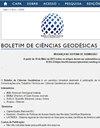SHORELINE MONITORING BY GNSS-PPP AIMING TO ATTENDANCE THE LAW 14.258/2010 FROM PERNAMBUCO STATE, BRAZIL
IF 0.5
Q3 Earth and Planetary Sciences
引用次数: 5
Abstract
The geodetic shoreline positioning has socioeconomic importance due to decision-making support related to the coastal zone. The Pernambuco state, Brazil, has established a state law no. 14.258/2010 sanctioned as part of Coastal Zone Management State Policy. The state act no. 42.010/2015 enacted the baseline information for Pernambuco shoreline. Considering that the shoreline mapping benefits from GNSS positioning using relative or absolute methods, the absolute PPP was the choice for legislation support. Therefore, the aim of this work is to depict about the Pernambuco state law and analyze the kinematic PPP accuracy applied to shoreline monitoring in order to attend the state act. The relative GNSS method was adopted as reference to assess the PPP accuracy for the Pernambuco shoreline. The analyses for each sector involved approximately one hour of kinematic GNSS data and the results indicate horizontal positioning accuracy around 0.50 m after PPP convergence period. Several PPP re-initialization has been detected, however, points considered outliers are removed from the final product. For this reason, recommendations are provided to improve the positioning applied for coastal zone monitoring. Although, the carried out experiments shows that PPP can be adopted as a practical tool to support the Pernambuco Coastal Zone ManagementGNSS-PPP海岸线监测旨在遵守巴西伯南布哥州2010年8月14日的法律
大地测量岸线定位具有重要的社会经济意义,因为它可以为海岸带相关的决策提供支持。巴西伯南布哥州已经制定了一项州法律。14.258/2010作为海岸带管理国家政策的一部分被批准。国家法案no。42.010/2015制定了Pernambuco海岸线基线信息。考虑到GNSS定位的相对方法和绝对方法对岸线测绘的好处,立法支持选择绝对PPP。因此,本工作的目的是描述伯南布哥州的法律,并分析运动学PPP精度应用于海岸线监测,以便参加州行为。采用相对GNSS方法对Pernambuco岸线PPP精度进行评估。对每个扇区的分析涉及大约一小时的GNSS动态数据,结果表明PPP收敛期后的水平定位精度约为0.50 m。已经检测到几个PPP重新初始化,但是,从最终产品中删除了被认为是异常值的点。为此,提出了改进海岸带监测定位的建议。尽管如此,所进行的实验表明,PPP可以作为一种实用的工具来支持伯南布哥沿海地区管理
本文章由计算机程序翻译,如有差异,请以英文原文为准。
求助全文
约1分钟内获得全文
求助全文
来源期刊

Boletim De Ciencias Geodesicas
Earth and Planetary Sciences-General Earth and Planetary Sciences
CiteScore
1.70
自引率
20.00%
发文量
10
审稿时长
3 months
期刊介绍:
The Boletim de Ciências Geodésicas publishes original papers in the area of Geodetic Sciences and correlated ones (Geodesy, Photogrammetry and Remote Sensing, Cartography and Geographic Information Systems).
Submitted articles must be unpublished, and should not be under consideration for publication in any other journal. Previous publication of the paper in conference proceedings would not violate the originality requirements. Articles must be written preferably in English language.
 求助内容:
求助内容: 应助结果提醒方式:
应助结果提醒方式:


